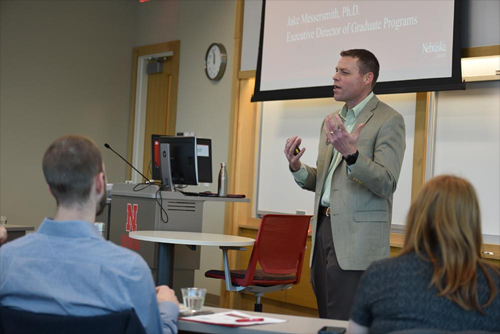Motivation and workplace culture play an important role in employee satisfaction. Two faculty members recently presented information about these factors in Executive Education Power Lunches at the College of Business. Three key takeaways include: different motivational styles, the research on salary satisfaction and the understanding of cultural influences.
Is money the prime motivation?
Perhaps. Some people are intrinsically motivated, meaning they engage in an activity because they find it inherently interesting or enjoyable. Others are extrinsically motivated. They act in certain ways to secure a reward or avoid a consequence. The types of motivation a manager uses can affect both the quantity and quality of work from individuals, said Dr. Jake Messersmith, associate professor of management, in his recent power lunch “Moving Beyond Carrots and Sticks: Unlocking Motivation in the Modern Workplace.”
“Pay for performance drives quantity, but not necessarily quality. As managers, we want our employees to be motivated, so they produce great work. For some employees, money remains a major motivator because they’re being paid for doing something they already enjoy. But to motivate everyone, you must look at many factors in job satisfaction that vary by employee and the type of job they have,” Messersmith said.
What salary is key to employee happiness?
 Dr. Jake Messersmith, associate professor of management and executive director of graduate programs, shares tips for motivating employees.
Dr. Jake Messersmith, associate professor of management and executive director of graduate programs, shares tips for motivating employees.
The Gallup World Poll data indicates the salary range of $70,000 to $75,000 enables the majority of people to reach the maximum daily level of happiness that money can provide. But Messersmith pointed out the relative deprivation theory, which states that everything is relative. So whether $70,000 is enough for an individual may depend on what the people around them earn and what they feel they deserve in comparison.
“We are always in constant comparison with others, for better or worse. If you feel a co-worker is not putting in as much effort or doing as much as you are but receives the same compensation, you might feel upset, and your job satisfaction and motivation levels drop,” Messersmith said.
How does one’s culture impact their work?
Working in an increasingly global economy also means working with many different people who likely have a variety of cultural and ethnic backgrounds and expectations. Culture shapes our assumptions about business and influences how employees communicate and build relationships. Dr. Elina Ibrayeva, associate professor of practice in management, addressed the research on this topic and brainstormed with attendees of her power lunch “Cracking The Code Of Culture” how to more effectively cross-culturally communicate.
“You may hear ‘culture is like an iceberg,’ with only a small part visible at the surface. My favorite analogy for culture is that of an onion. Each layer is interdependent, with the most important differences at its heart. To me, the biggest difference in cultures is between individualism and collectivism,” Ibrayeva said.
Behavior makes sense through the eyes of that person, so paying more attention to the context of the behavior helps to recognize its cultural influences. Closing this cultural gap in the workplace can be complex but crucial to collaboration and productivity. It first requires putting aside our own biases and assumptions and learning the real cultural differences that exist.
Digging Deeper
Interested in going more in depth on topics useful in the modern workforce? Messersmith will explore adaptive leadership in his upcoming Executive Education certificate program, “Being a Change Agent: Applying the Principles of Adaptive Leadership,” on Friday, March 29.
Other upcoming professional development opportunities include:
-
Communication Boot Camp: Present Your Ideas Effectively – Friday, March 15, 8 a.m.-5 p.m.
-
Design Thinking: A Systemic Approach to Innovation in the Workplace – Friday, May 3, 9 a.m.-5 p.m.
Published: March 7, 2019